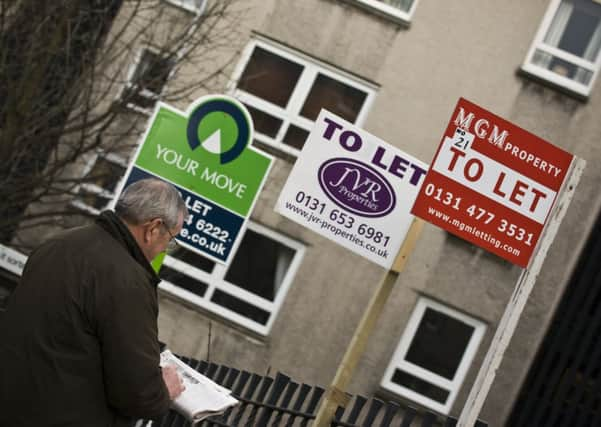Rent rises ‘not down to new law’


CLAIMS that Scottish government legislation aimed at protecting tenants has inadvertently driven up rental costs have been dismissed as “bogus” and inaccurate.
UK-wide estate agent Your Move said last week that tenants in Scotland had suffered as a direct result of a ban imposed two years ago on the upfront fees they can be charged by letting agents and landlords.
Advertisement
Hide AdAdvertisement
Hide AdThe Scottish Government’s move, which took effect in November 2012, clarified rules originally set out in 1984 making all tenant charges, other than rent and a refundable deposit, illegal.
It followed a campaign by homelessness charity Shelter Scotland urging tenants to reclaim fees such as those charged for references, credit and inventory checks.
But tenants have been hit hard by the legislation, according to Your Move. It said average rental costs have risen 2.3 per cent since the ban came into force, a faster rate of increase than that seen south of the Border. Rents had been stable for almost two years until late 2012, Your Move claimed.
At a record £534 a month the average rent in Scotland is now 2.7 per cent higher than a year ago, its figures show. Tenants are paying £26 more a month than before the rules were clarified, said Your Move, outstripping the upfront costs that tenants were previously charged by landlords and letting agents.
The biggest increases over the last 12 months have been in the south of Scotland (4.8 per cent), Edinburgh and the Lothians (3.6 per cent) and Glasgow and Clyde, where rents are 3 per cent higher than a year ago. Gordon Fowlis, regional managing director of Your Move, said: “Tenancy fees were outlawed in Scotland with the well-meaning intention of protecting thousands of households reliant on rental accommodation. But we can see that in reality tenants are starkly out of pocket.
“Banning fees has heightened the financial strain on tenants, as greater costs are now incurred elsewhere through rents increasing at a faster pace.”
He argued that further regulation currently poses the biggest threat to the private rented sector.
However his comments come as the Labour party proposes a similar ban on tenant fees in England.
Advertisement
Hide AdAdvertisement
Hide AdGraeme Brown, director of Shelter Scotland, said there was no evidence of a link between rental costs and the tenant fees ban.
“This claim is bogus and little more than an assumption that rents must have risen due to the clarification that letting agents’ fees are illegal.”
Research carried out for Shelter earlier this year by estate agent Rettie & Co found no evidence of the tenant ban having an adverse impact on rental prices. Instead the report attributed movements in Scottish rent levels to “wider economic and market factors”, adding the legislative changes were likely to have had “minimal impacts” in comparison.
It also revealed that landlords in Scotland are no more likely that those elsewhere in the UK to have hoisted their prices.
“Fewer than 1 in 5 agency managers said that they had increased their fees to landlords since the law was clarified and the majority of landlords in Scotland who use agents have not noticed any increase in fees from their agents since 2012,” said Brown.
He pointed out that the rent spike reported by Your Move only started last summer, some time after the legislation was enforced. And while the rent rise north of the Border is marginally higher than the 2 per cent reported for England and Wales, there are signs that the pressure on rental costs in Scotland is now easing, Brown added.
A host of factors have influenced rental costs, including the 2012 launch of the Scottish tenant deposit scheme and, more pertinently, strong demand for rental accommodation.
David Alexander, managing director of letting agency DJ Alexander, said: “The increase is mainly down to the fact that renting has become more of an accepted form of tenure and one whose popularity is growing all the time.
Advertisement
Hide AdAdvertisement
Hide Ad“Despite all the hype about the so-called soaring cost of renting a property, historically, and balanced out over a long period, rents have not risen in line with the cost of living so perhaps this is a case of them finally catching up.”